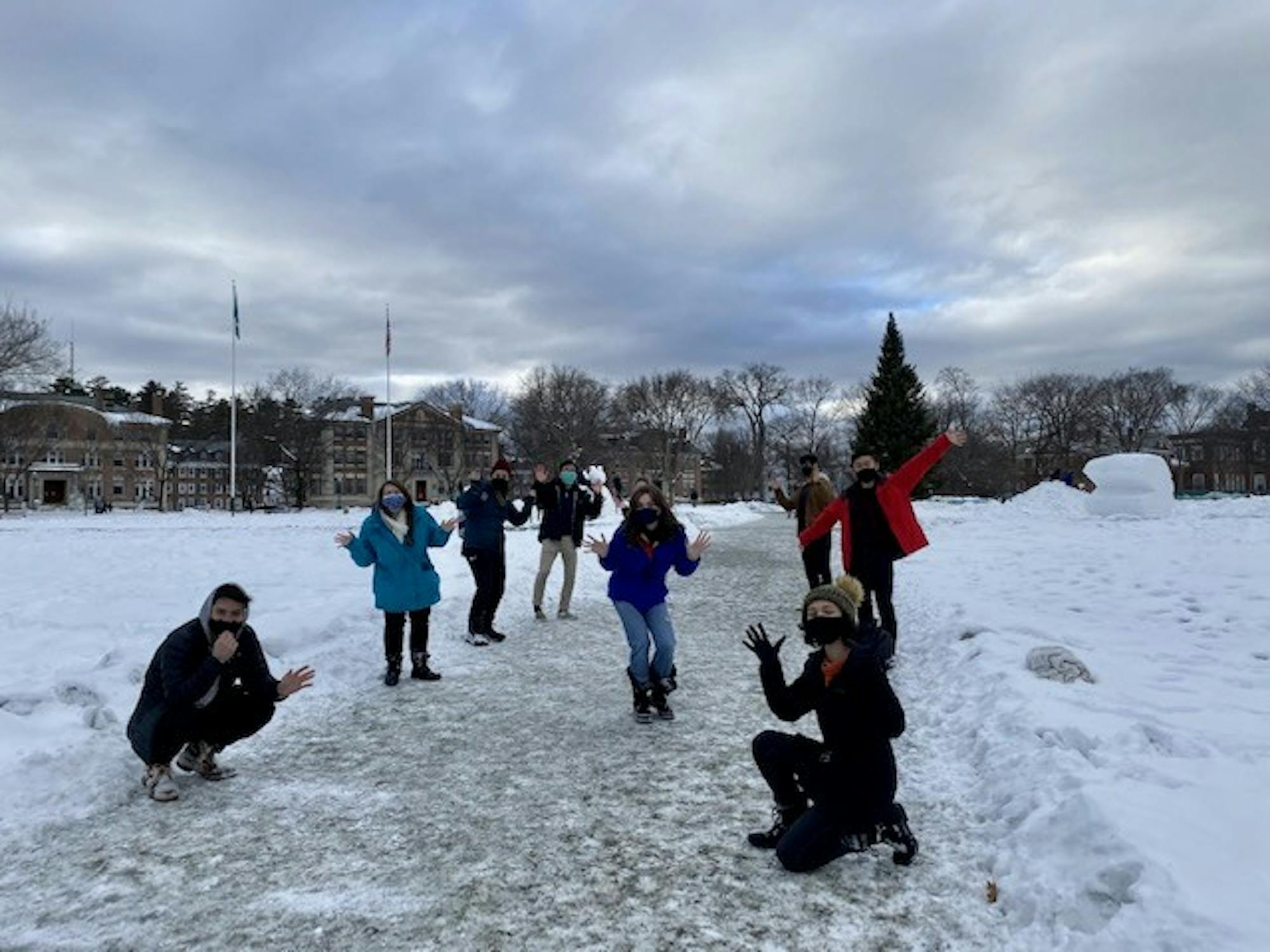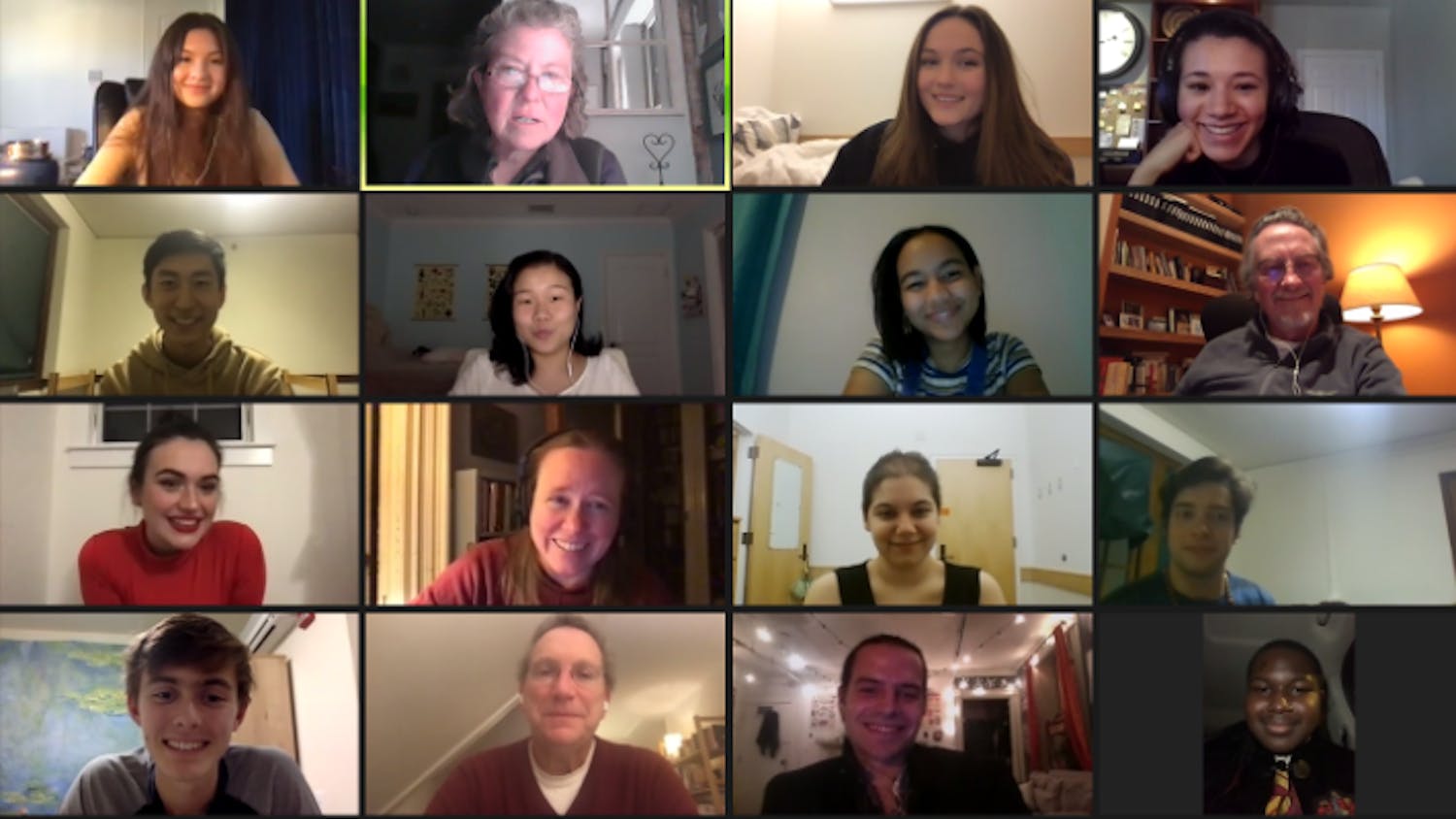“The Radical Joy Project” is a mixed media student performance series showcasing a wide range of art forms including music, theater and dance. The project seeks to convey the joy and liberation that art can bring, through singing, acting and dancing. In three parts — “The Past,” “The Present” and “The Future” — the performance explores the overarching theme of joy, with a focus on finding joy in the current trying times. The series is set to premiere on April 8 and 9 at 8 p.m. on the Hopkins Center for the Arts's Youtube channel.
This interdisciplinary project is co-directed by Dartmouth theater lecturer and Northern Stage producing artistic director Carol Dunne, JAG Productions producing artistic director Jarvis Green and WP Theater Bold associate artistic director Rebecca Martínez. The difficulties of this past year led the three co-directors to embrace the concept of “radical joy” through art and activism.
In a “Meet the Directors” video presented by the Hop, Green defines radical joy as “centering pleasure and joy in the art-making process.” Green added that the Project allows for an open-ended exploration of joy and will ultimately culminate in a collage of different clips, each with plot lines of their own featuring various artistic performances.
According to theater director Jamie Horton, the Radical Joy Project took a different approach to its auditions than other shows at Dartmouth typically do. He noted that the production welcomed anyone with an artistic interest in the concept and required no previous experience. The auditions, which were held during winter, included a conversation with the co-directors along with a demonstration of the students’ skillset.
The formation of “The Radical Joy Project” also involved creative input from students. The project is the first “devised” piece — meaning that the entire show is created in collaboration with the cast — from the theater department in several years. According to Horton, the production is meant to respond to different student perspectives amid “a world of converging pandemics” and ultimately to showcase their resilience and strength.
After joining the project, students spent the first few weeks crafting and exploring ideas. The co-directors provided the project with the general framework of the three sections, but the details and direction were up to the students.
Jacqueline Byrne ‘22 said that for her portion of the production, the co-directors connected her with monologue writer Marisa Smith. Byrne knew she wanted her monologue to focus on the passion for cooking that she developed during quarantine, and Dunne and Smith helped her create a framework from there.
“Marisa Smith wrote me this very awesome monologue,” Byrne said. “I used Zoom to take a video of myself on my laptop doing this monologue. The monologue was very close to my real life, in terms of how much cooking means to me.”
The co-directors also held Zoom sessions where cast members participated in different exercises intended to spur creativity, according to cast member Alexandra Bramsen ’22. These exercises involved activities such as each cast member bringing in objects that were meaningful to them to prompt creative discussions.
“A lot of my inspiration for writing came from a time when we were looking at different prompts and everyone was giving their feelings about the past year,” Bramsen said.
After brainstorming, the directors worked with students to create an outline for the overall show that integrated their concepts and skills. Then, students started bringing their ideas to life.
One performance piece, for example, is centered around the theme of keening — the act of making a sound of intense mournful wailing after a death. Student cast members were able to demonstrate how they would keen in their own unique ways, according to Bramsen.
Some students have pursued musical projects. Isaiah Brown ’23 said he spent the winter term creating and recording an original song with Edward Lu ‘21.
“I started with nothing for that song, and I had this session with one of the directors, Jarvis, where I just played some of my favorite songs … almost like hanging out,” Brown said. “And then from that, we just got this sense of what we could create for me.”
According to Horton, the theater department has been shipping green screens and microphones to students across the country in an effort to maintain the same level of audio and visual quality regardless of location. He added that other challenges have included ensuring access to stable WiFi and syncing audios remotely when participants are performing music.
“[W]e accept the fact that it’s not a perfect universe, and there are technical glitches that we’re going to encounter,” Horton said. “Everybody is just approaching [the project] with that spirit in mind.”
Despite the largely remote nature of the performance, some cast members had the opportunity to gather in person, convening on the Green toward the end of winter term to film a section of interdisciplinary performance on a drone.
“To see them all and to greet them in a socially distanced way … was just really touching to me, and I think to the others who were there,” Horton said. “This drone footage … has a peculiar power of togetherness.”
Horton hopes the audience will recognize the power of inspiration and collaborative creation in this piece.
“[The performance] pulls us together at this moment,” Horton said, “in the spirit of reminding us all about the importance of joyful creation, and [in] an environment where just disappointment, despair and so many other things are so prevalent.”
Jessica Sun Li '24 is a sociology major and English minor from the suburbs of Chicago. She was the 180th Directorate's arts editor, and her passion project is the "Dear Mirror" column. Outside of The Dartmouth, she is involved in the figure skating team and sociology research. She really wants to adopt a cat.



